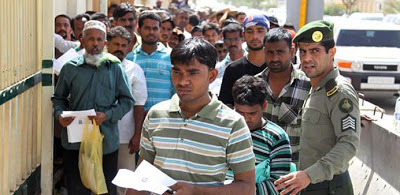
Riyadh, Nov 3: Thousands of illegal foreigners, mostly unskilled workers from Asia, are rushing to leave Saudi Arabia before an amnesty expires on Sunday as they risk being fined or even jailed.
Nearly a million Bangladeshis, Filipinos, Indians, Nepalis, Pakistanis and Yemenis, among others, have taken advantage of the three-month amnesty announced on April 3 and then extended for four months and left the country.
Another roughly four million have legalised their situation by finding employers to sponsor them, a must to reside in most Gulf monarchies.
But the clock is ticking, and the Saudi Labour Ministry has said there will be no second chance, despite appeals from some Asian governments.
Amnesty not to be extended
“We have absolutely no intention of prolonging the amnesty,” said Ministry spokesman Hattab al-Anzi.
Pakistan said this week that it has been pressing for an extension of the amnesty until the end of January.
Even so, its Foreign Ministry spokesman Aizaz Ahmad Chaudhry said: “We are trying our best to legalise as many Pakistanis as we can before the deadline ends.”
In contrast, Indian Foreign Ministry spokesman Syed Akbaruddin told AFP “we have not asked for extra time,” explaining Indians had been urged to “abide by the rules, and we have had quite remarkable success.”
Rushing through paperwork
So foreigners are queuing up outside governmental offices either to sort out the paperwork for leaving the kingdom or legalising their stays.
The Arab News daily said some Indians seeking repatriation had waited more than 31 hours outside the deportation centre in the Red Sea city of Jeddah to get the documents to leave.
The immigration department said on Thursday that “more than 9,00,000 people have left the country with final exit visas.”
Saudi Arabia, the world’s largest oil exporter, is a goldmine for millions of people from Asia and elsewhere in the Arab world, who find work as common labourers, drivers, porters and house maids.
Expatriates account for around nine million of the country’s 27 million population.
Saudi Arabia has the Arab world’s largest economy, but the unemployment rate among natives is above 12.5 per cent, a figure the government is aiming to reduce.





Comments
Add new comment